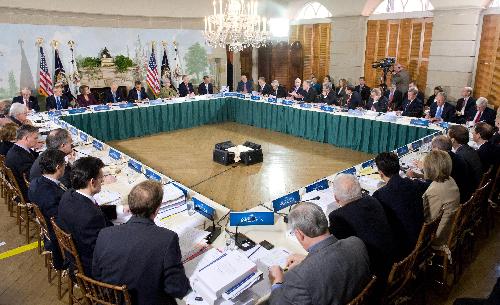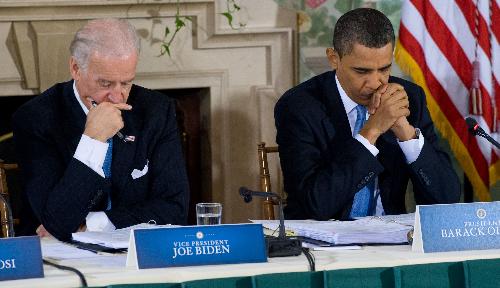Obama, GOP fail to reach accord on health bill
U.S. President Barack Obama wrapped up a bipartisan health care summit on Thursday, saying that he would move ahead with the health care reform with or without Republicans.
 |
|
U.S. President Barack Obama Thursday hosts a bipartisan health care summit in Washington, D.C., where over 30 Democratic and Republican lawmakers would discuss how to bridge their differences on the top issue of the country's political agenda. [Xinhua/AFP Photo] |
"The question that I'm going to ask myself and I ask of all of you is, 'is there enough serious effort that in a months time or a few weeks time or six weeks time, we could actually decide something?' And if we can't, I think we've got to go ahead and make some decisions and then that's what elections are for," he said before the seven hour-long summit adjourned.
He told Republicans to do some "soul-searching" on how to settle on what ideas they can agree to extend health insurance to the 30 million uninsured people.
There is probably no another summit since "we cannot have another year-long debate about this," and Democrats have to move ahead without Republicans if the gap between them on the health care issue can't be bridged, he added.
One of few options for Democrats to push forward with the Obama administration's health reform proposal is to resort to "Budget Reconciliation," which can make it avoid filibuster and need only a simple majority of 51 votes to be passed at the Senate.
 |
|
U.S. President Barack Obama(R) and Vice President Joe Biden listen at the bipartisan health care summit Thursday in Washington, D.C.. [Xinhua/AFP Photo] |
The strategy was described by White House officials as "the last exit to the gas station on Interstate," which carries the last and best hope to realize the health care overhaul reform in next decades.
However, Republicans blast it as a way of partisan to defeat bipartisan Obama has been always longing for.
The House of Representatives and the Senate has separately passed their own version of the health care reform bill but the unified version was stalled in Congress after Scott Brown, a Republican, won the special election for a Senate seat in Massachusetts, ending Democratic Party's supermajority status in the floor.
Prior to the summit held at the Blair House near the White House, Obama released the White House's proposal on the health care reform on Monday and called on his rival party to also present their own version.
A total of 18 Democrats and 14 Republicans lawmakers, including bipartisan leaders in the two chambers and heads of Congress committees playing roles in the process of health care legislation, made their comments on the health care reform process one by one.
White House officials including Vice President Joe Biden and Health and Human services Secretary Kathleen Sebelius also attended the meeting.
In his opening remarks, Obama urged bipartisan lawmakers to "look at some fundamental structural problems in economy."
"This is an issue that is affecting everybody, it's affecting not only those without insurance but it's affecting those with insurance," he said. "I think this concern is bipartisan."
He expressed the hope that Democratic and Republican lawmakers can focus on what they agree instead of what they disagree.
However, Republicans wanted to "start from a clean sheet of paper" and were opposed to pushing forward with it by a partisan way.
"This is a car that can't be recalled and fixed and we ought to start over," said Lamar Alexander, a Republican senator from Tennessee, at the summit. "We've come to the conclusion that we don't do comprehensive well."
He also said that the United States is "too big and too complicated" to be managed by a central government.
In their defense, House Speaker Nancy Pelosi told the meeting that it is too late over on President Barack Obama's proposed health care overhaul, and the White House's proposal already included Republican opinion and deserve their support.
The meeting is broadcast live across the nation and features four major themes, which are cost control, deficit deduction, insurance reform and coverage expansion, according to the White House.
A national poll released on Wednesday by CNN and Opinion Research, 48 percent of Americans believe that lawmakers should work on an entirely new bill, while 25 percent said Congress should pass legislation similar to the bill passed by the two chambers. Another 25 percent said Congress should stop all work on health care reform.
 0
0 






